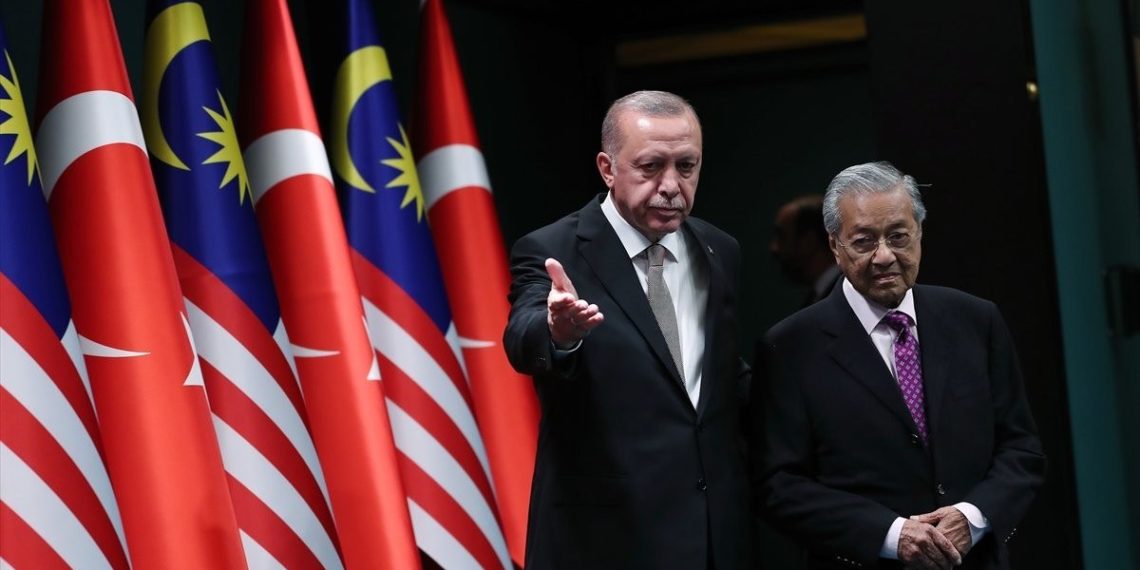
Identical media reports said that the Saudi regime using the weapon of financial threats to try to thwart the mini-Islamic summit scheduled in Kuala Lumpur today.
The Saudi regime sees in the Kuala Lumpur summit a clear reduction of its influence and hegemony over Islamic countries, and it exerted great pressure to reduce the number of heads of state participating in the summit.
The regime pressured Pakistani Prime Minister Imran Khan and Indonesian President Goku Widodo in order not to participate in the summit that brings Turkish President Recep Tayyip Erdogan, Emir of Qatar Tamim bin Hamad Al Thani and Prime Minister of Malaysia Malaysian Mahathir Muhammad as well as politicians and intellectuals estimated at 450 people, among them Iranian President Hassan Rouhani.
On the eve of the convening of the mini-Islamic summit in Kuala Lumpur, over the next two days, Imran Khan canceled his participation, as a result of Gulf pressures, according to the information of “Al-Arabi Al-Jadeed”, which were also reported by many Pakistani newspapers.
Several local Pakistani media outlets, including “Geo”, “Dawn”, “The News” and “The Express Tribune”, issued a statement issued by the office of the Prime Minister of Malaysia, stating that the latter received a phone call from his Pakistani counterpart last night, who expressed he regretted that he was unable to participate in the Kuala Lumpur Summit.
The statement itself quoted Mahathir as clarifying what he called “misinformation” claiming that the summit aims to be a platform to replace the Organization of the Islamic Conference, a statement that aroused the ire of Saudi Arabia, the UAE and Bahrain, according to Pakistani media sources.
While sources confirmed that Khan’s cancellation of his participation in the summit was the result of Gulf pressure, without specifying it, the Express Tribune reported that Khan’s decision came as a result of “Saudi reservations,” as the latter visited the Kingdom last Sunday, and he met the Saudi Crown Prince Muhammad bin Salman, and confirmed He told him, “Participation in the summit will not be at the expense of Saudi Arabia.”
On the other hand, the English-language Dawn newspaper quoted sources in the Pakistani Foreign Ministry that Khan also informed Turkish President Recep Tayyip Erdogan of his decision not to participate in the summit, pointing out that the decision “was at the outset that Khan did not participate in the summit and was attended by the Foreign Minister Shah Mahmoud Qureshi; but after research and wait, the decision was taken not to participate in the summit.”
However, the participation of Qureshi as a representative of Pakistan or not is not yet clear, as other local media sources have reported that Qureshi will represent Pakistan at the summit instead of Khan.
In the context, the “News” website quoted unnamed sources as saying that Saudi Arabia expressed “its deep concern over the statement of the Malaysian Prime Minister who said that the Islamic countries in Kuala Lumpur will constitute a new platform for replacing the Organization of Islamic Cooperation, which has failed to solve the problems of Islamic countries”.
She added that “the UAE also expressed its concern about the statement, and asked Pakistan not to participate in the summit,” and so did Bahrain, according to the same sources.
According to “The News”, Abu Dhabi Crown Prince Mohammed bin Zayed conveyed his concern about the participation of Pakistan to the commander of the Pakistani forces, General Qamar Jawad, in Goa on December 14, but without specifying how he conveyed this concern to him.
The Special Adviser to the Pakistani Prime Minister, Dr. Ferdous Ashiq Awan, confirmed yesterday in a press statement to her that any decision in this regard will be within the interests of Pakistan.
The five countries participating in the summit constitute a major force in the world, with about 350 million people, the total population, and a geographical area of 3 million square kilometers stretching between the continents of Europe and Asia, and these countries occupy advanced positions among the 50 largest countries in terms of GDP, total GDP was $1.4 trillion during 2018.
The Saudi regime has undermined the Kingdom’s position in the Arab and Islamic worlds due to its crimes and violations, especially in light of its adoption of an approach based on recklessness and criminal interference in many Arab countries.
What may happen in the Kingdom is not only a Saudi affair, but rather affects the level of foreign policy, but even in internal options, has implications for its geographical and cultural environment, and for the global oil market, and from there on the global economy.
The legal status of the Kingdom as an incubator and guardian of the holy places of Muslims has always made it the focus of attention by Muslims.